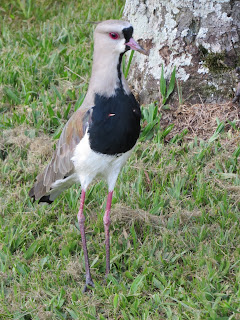Os Pássaros: The Birds
I haven't left the city, and yet on my first day I identified fourteen new species of bird! Birds of Brazil is officially my new favorite book.
I've included photos from my first week in Brazil and my guesses at identification. Birders of the world, please comment with your corrections and ideas. Happy vicarious birding!
Hint: click on any photo to see a high-resolution slide show.
I've included photos from my first week in Brazil and my guesses at identification. Birders of the world, please comment with your corrections and ideas. Happy vicarious birding!
Hint: click on any photo to see a high-resolution slide show.
 |
| Southern lapwing. Flock pecking in grass in front of school. |
 |
| Black vulture. About thirty circling above city; several perched in trees along highway. |
 |
| Chalk-browed mockingbird. Singing in a tree. |
 |
| Eared dove. Common on ground and in trees on campus. |
 |
| Some sort of flycatcher? |
 |
| Red-legged seriema. Huge bird, 35 inches long! Shirota told us this individual is usually with its mate, which might have died. |
 |
| Domestic duck in the campus pond. |
 |
| Rather territorial domestic geese. |
 |
| A Muscovy duck in a tree. Makes sense, because this is the only domesticated duck not descended from the mallard. It's not a dabbling duck -- it's a tree duck! |
 |
| Rufous-collared sparrow. Bathing in a puddle. |
 |
| Neotropic cormorant. Posing near the main campus pond. Look at those blue eyes! |
 |
| Black-crowned night heron. Fishing on the Piracicaba River. |
 |
| Another black-crowned night heron. Maybe these two are mates. |
 |
| A pair of black-crowned night herons perched in a nearby tree over the river. |
 |
| Great egret. One of several in the brown, rushing river. |
 |
| A female house sparrow. No discrimination against boring birds here! |
 |
| A pair of wood storks!!!! Look how small they make the great egret seem! |
 |
| Ringed kingfisher. You can tell she's a female by the blue bib on her chest. |
 |
| Not birds -- but you can't ignore a family of capybaras, the world's largest rodents! |
 |
| Mama capy and baby capy. Like giant guinea pigs with hooves. |
 |
| Hooded siskin. The drabber female is perched on a nearby chain-link fence. |
 |
| Burrowing owl. Sleeping on a streetlight in the middle of the day! Shouldn't you be in a hole? |
 |
| Social flycatcher? This could also be a rusty-margined flycatcher, or maybe a kiskadee. |
 |
| Not even going to try. |
 |
| This is a lizard, folks. |
 |
| Yellow-chevroned parakeet. A flock of five were eating nuts in a street tree. |